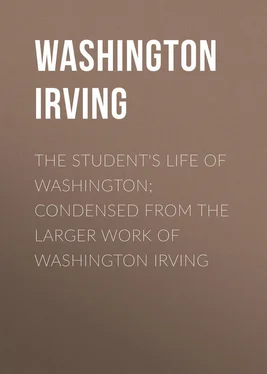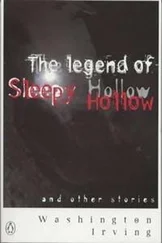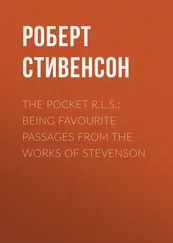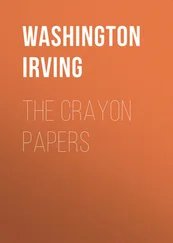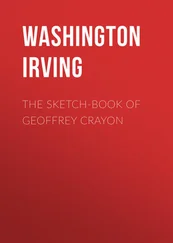Washington Irving - The Student's Life of Washington; Condensed from the Larger Work of Washington Irving
Здесь есть возможность читать онлайн «Washington Irving - The Student's Life of Washington; Condensed from the Larger Work of Washington Irving» — ознакомительный отрывок электронной книги совершенно бесплатно, а после прочтения отрывка купить полную версию. В некоторых случаях можно слушать аудио, скачать через торрент в формате fb2 и присутствует краткое содержание. Издательство: Иностранный паблик, Жанр: literature_19, foreign_antique, foreign_prose, на английском языке. Описание произведения, (предисловие) а так же отзывы посетителей доступны на портале библиотеки ЛибКат.
- Название:The Student's Life of Washington; Condensed from the Larger Work of Washington Irving
- Автор:
- Издательство:Иностранный паблик
- Жанр:
- Год:неизвестен
- ISBN:нет данных
- Рейтинг книги:3 / 5. Голосов: 1
-
Избранное:Добавить в избранное
- Отзывы:
-
Ваша оценка:
- 60
- 1
- 2
- 3
- 4
- 5
The Student's Life of Washington; Condensed from the Larger Work of Washington Irving: краткое содержание, описание и аннотация
Предлагаем к чтению аннотацию, описание, краткое содержание или предисловие (зависит от того, что написал сам автор книги «The Student's Life of Washington; Condensed from the Larger Work of Washington Irving»). Если вы не нашли необходимую информацию о книге — напишите в комментариях, мы постараемся отыскать её.
The Student's Life of Washington; Condensed from the Larger Work of Washington Irving — читать онлайн ознакомительный отрывок
Ниже представлен текст книги, разбитый по страницам. Система сохранения места последней прочитанной страницы, позволяет с удобством читать онлайн бесплатно книгу «The Student's Life of Washington; Condensed from the Larger Work of Washington Irving», без необходимости каждый раз заново искать на чём Вы остановились. Поставьте закладку, и сможете в любой момент перейти на страницу, на которой закончили чтение.
Интервал:
Закладка:
Similar results attended visits made by Gist and Croghan to the Delawares and the Shawnees at their villages about the Scioto River; all promised to be at the gathering at Logstown. From the Shawnee village, near the mouth of the Scioto, the two emissaries shaped their course north two hundred miles, crossed the Great Moneami, or Miami River, on a raft, swimming their horses; and, on the 17th of February, arrived at Piqua, the principal town of the Twightwees or Miamis; the most powerful confederacy of the West, combining four tribes, and extending its influence even beyond the Mississippi. A king or sachem of one or other of the different tribes presided over the whole. The head chief at present was the king of the Piankeshas. At this town Croghan formed a treaty of alliance in the name of the governor of Pennsylvania with two of the Miami tribes. And Gist was promised by the king of the Piankeshas that the chiefs of the various tribes would attend the meeting at Logstown to make a treaty with Virginia. [In the height of these demonstrations of friendship, two envoys from the French governor of Canada entered the council-house and sought a renewal of the ancient alliance. But the Piankesha chief turned his back upon the ambassadors, and left the council-house.]
When Gist returned to the Shawnee town, near the mouth of the Scioto, and reported to his Indian friends there the alliance he had formed with the Miami confederacy, there was great feasting and speech-making, and firing of guns. He had now happily accomplished the chief object of his mission – nothing remained but to descend the Ohio to the Great Falls. This, however, he was cautioned not to do. A large party of Indians, allies of the French, were hunting in that neighborhood, who might kill or capture him. He crossed the river attended only by a lad as a travelling companion and aide, and proceeded cautiously down the east side until within fifteen miles of the Falls. Here he came upon traps newly set, and Indian footprints not a day old; and heard the distant report of guns. The story of Indian hunters then was true. Abandoning all idea, therefore, of visiting the Falls, and contenting himself with the information concerning them which he had received from others, he shaped his course homeward.
While Gist had been making his painful way homeward, the two Ottawa ambassadors had returned to Fort Sandusky, bringing word to the French that their friendship had been rejected and their hostility defied by the Miamis. They informed them also of the gathering of the western tribes that was to take place at Logstown, to conclude a treaty with the Virginians.
It was a great object with the French to prevent this treaty, and to spirit up the Ohio Indians against the English. This they hoped to effect through the agency of one Captain Joncaire, a veteran of the wilderness, who had grown gray in Indian diplomacy, and was now sent to maintain French sovereignty over the valley of the Ohio. He appeared at Logstown accompanied by another Frenchman, and forty Iroquois warriors. He found an assemblage of the western tribes, feasting and rejoicing, and firing off guns, for George Croghan, and Montour, the interpreter, were there, and had been distributing presents on behalf of the governor of Pennsylvania.
Joncaire was said to have the wit of a Frenchman, and the eloquence of an Iroquois. He made an animated speech to the chiefs in their own tongue, the gist of which was that their father Onontio (that is to say, the governor of Canada) desired his children of the Ohio to turn away the Indian traders, and never to deal with them again on pain of his displeasure; so saying, he laid down a wampum belt of uncommon size, by way of emphasis to his message. For once his eloquence was of no avail; a chief rose indignantly, shook his finger in his face, and stamping on the ground, "This is our land," said he. "What right has Onontio here? The English are our brothers. They shall live among us as long as one of us is alive. We will trade with them, and not with you;" and, so saying, he rejected the belt of wampum.
Joncaire returned to an advanced post recently established on the upper part of the river, whence he wrote to the governor of Pennsylvania: "The Marquis de la Jonquiere, governor of New France, having ordered me to watch that the English make no treaty in the Ohio country, I have signified to the traders of your government to retire. You are not ignorant that all these lands belong to the King of France, and that the English have no right to trade in them." He concluded by reiterating the threat made two years previously by Celeron de Bienville against all intruding fur traders. In the meantime, in the face of all these protests and menaces, Mr. Gist, under sanction of the Virginia Legislature, proceeded in the same year to survey the lands within the grant of the Ohio company, lying on the south side of the Ohio river, as far down as the great Kanawha.
The French now prepared for hostile contingencies. They launched an armed vessel of unusual size on Lake Ontario; fortified their trading-house at Niagara; strengthened their outposts, and advanced others on the upper waters of the Ohio. A stir of warlike preparation was likewise to be observed among the British colonies. It was evident that the adverse claims to the disputed territories, if pushed home, could only be settled by the stern arbitrament of the sword.
In Virginia, especially, the war spirit was manifest. The province was divided into military districts, each having an adjutant-general, with the rank of major, and the pay of one hundred and fifty pounds a year, whose duty was to attend to the organization and equipment of the militia. Such an appointment was sought by Lawrence Washington for his brother George, who set about preparing himself, with his usual method and assiduity, for his new duties. Virginia had among its floating population some military relics of the late Spanish war. Among these was a certain Adjutant Muse, a Westmoreland volunteer, who had served with Lawrence Washington in the campaigns in the West Indies. He now undertook to instruct his brother George in the art of war; lent him treatises on military tactics; put him through the manual exercise, and gave him some idea of evolutions in the field. Another of Lawrence's campaigning comrades was Jacob Van Braam, a Dutchman by birth, who had been in the British army, but was now out of service, and, professing to be a complete master of fence, recruited his slender purse in this time of military excitement, by giving the Virginian youth lessons in the sword exercise. Under the instructions of these veterans Mount Vernon, from being a quiet rural retreat, was suddenly transformed into a school of arms.
Washington's martial studies, however, were interrupted for a time by the critical state of his brother's health. The constitution of Lawrence had always been delicate, and he had been obliged repeatedly to travel for a change of air. There were now pulmonary symptoms of a threatening nature, and, by advice of his physicians, he determined to pass a winter in the West Indies, taking with him his favorite brother George as a companion. They accordingly sailed for Barbadoes on the 28th of September, 1751. George kept a journal of the voyage with log-book brevity, recording the wind and weather, but no events worth citation. They landed at Barbadoes on the 3d of November. The resident physician of the place gave a favorable report of Lawrence's case, and held out hopes of a cure.
The brothers had scarcely been a fortnight at the island when George was taken down by a severe attack of small-pox. Skilful medical treatment, with the kind attentions of friends, and especially of his brother, restored him to health in about three weeks; but his face always remained slightly marked.
The residence at Barbadoes failed to have the anticipated effect on the health of Lawrence, and he determined to seek the sweet climate of Bermuda in the spring. He felt the absence from his wife, and it was arranged that George should return to Virginia, and bring her out to meet him at that island. Accordingly, on the 22d of December, George set sail in the "Industry," bound to Virginia, where he arrived on the 1st of February, 1752, after five weeks of stormy winter seafaring.
Читать дальшеИнтервал:
Закладка:
Похожие книги на «The Student's Life of Washington; Condensed from the Larger Work of Washington Irving»
Представляем Вашему вниманию похожие книги на «The Student's Life of Washington; Condensed from the Larger Work of Washington Irving» списком для выбора. Мы отобрали схожую по названию и смыслу литературу в надежде предоставить читателям больше вариантов отыскать новые, интересные, ещё непрочитанные произведения.
Обсуждение, отзывы о книге «The Student's Life of Washington; Condensed from the Larger Work of Washington Irving» и просто собственные мнения читателей. Оставьте ваши комментарии, напишите, что Вы думаете о произведении, его смысле или главных героях. Укажите что конкретно понравилось, а что нет, и почему Вы так считаете.
